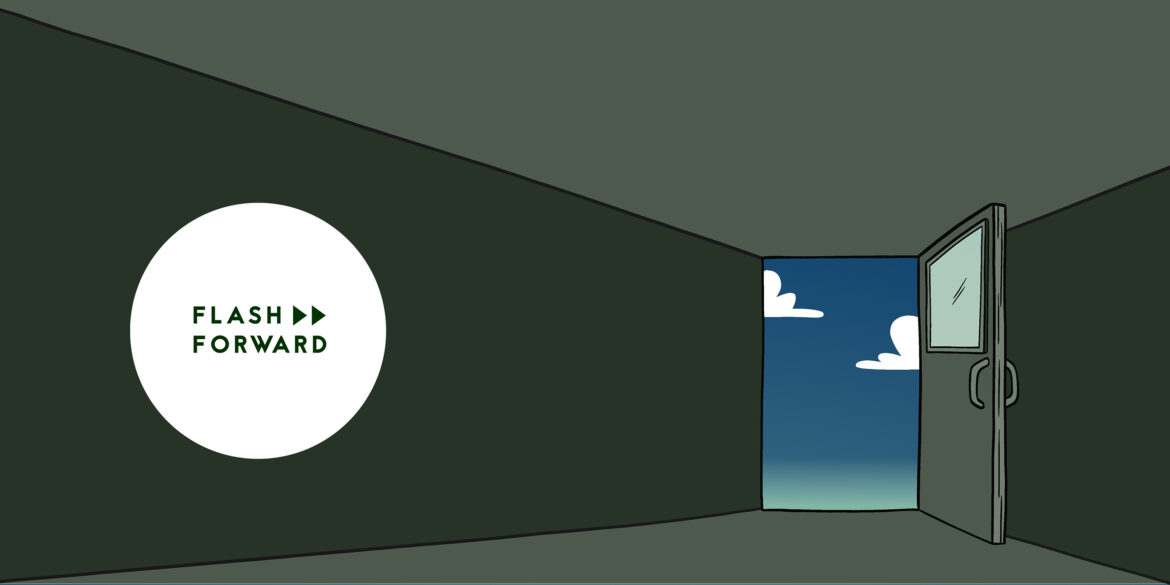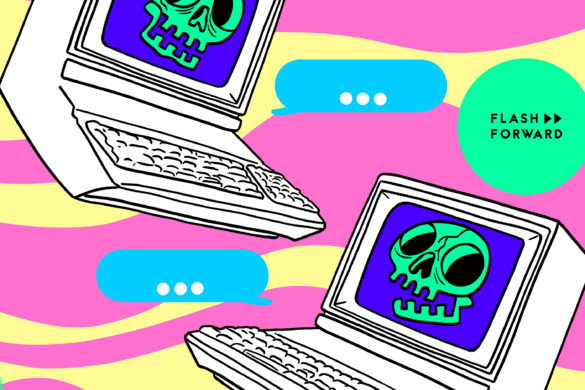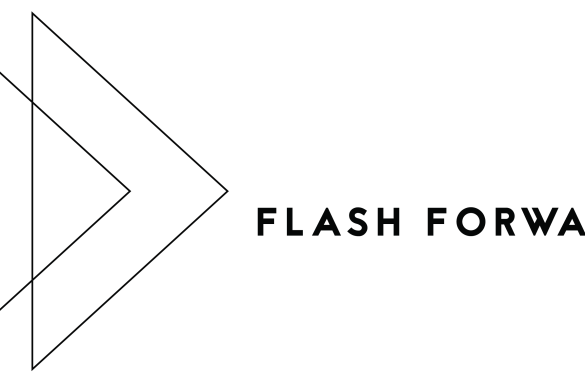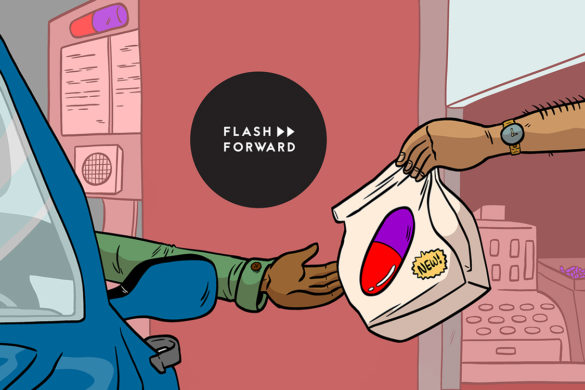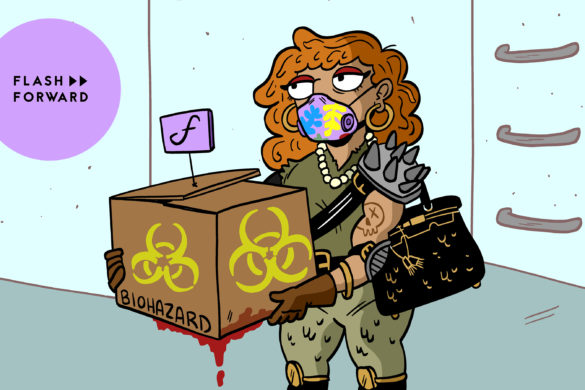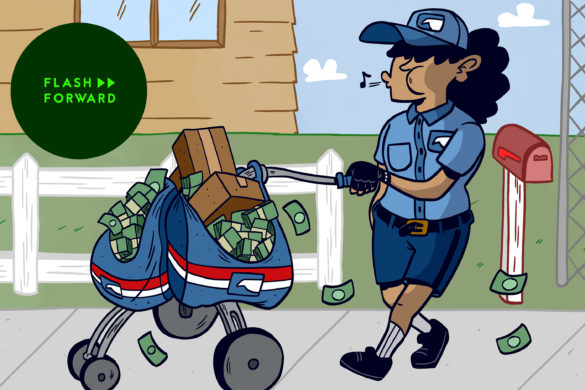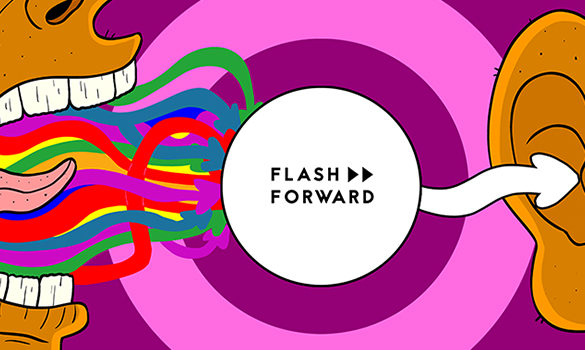Welcome to the end of Flash Forward. This is the first episode in our three-part show finale!! As I say goodbye to Flash Forward, I wanted to leave you all with a rumination on how to think about the future. How do you stay hopeful? How do we imagine better futures? How do we actually GET those better futures? This is my three-part love letter to you all, and to tomorrow.
Guests:
- Jack Shepherd — former editorial director BuzzFeed, author of On Words and Up Words newsletter, co-host of Strange Bedfellows podcast
- Dr. Adam Mastroianni — postdoctoral research scholar at Columbia Business School and author of Experimental History newsletter
- Liz Neeley — science communicator and founder of Liminal
- Dr. Ruha Benjamin — professor of African American studies at Princeton University and author of Viral Justice: How We Grow the World We Want
Further Reading:
- How to Restore Your Faith in Humanity (Wikihow)
- Faith in Humanity Restored (Know Your Meme)
- 21 Pictures That Will Restore Your Faith In Humanity
- Things could be better
- Viral Justice: How We Grow the World We Want
- “Sorrow Is Not My Name” by Ross Gay
- Hope Is A Discipline feat. Mariame Kaba
- “To be of use” by Marge Piercy
Poems Credits
“Sorrow Is Not My Name” from Bringing the Shovel Down by Ross Gay, Ⓒ 2011. Aired by permission of University of Pittsburgh Press.
“To be of use” by Marge Piercy Copyright ©1973, 1982 by Marge Piercy From CIRCLES ON THE WATER, Alfred A. Knopf. Used by permission of Robin Straus Agency, Inc.
This episode of Flash Forward was written by me, Rose Eveleth; edited by Avery Trufelman; produced by Ozzy Llinas Goodman and sound designed by Ariana Martinez. Much of the music in this episode is by Ilan Blanck. The outro music is by Hussalonia. The episode art is by Mattie Lubchansky.
Special thanks to Libby Larsen, who read Plates by Ethan Leos Verne; Emily C, who read Nailbunny’s post; Afi Yellow Duke who read “Sorrow is Not My Name” by Ross Gay; and Marge Piercy who read her poem “To be of use.”
FULL TRANSCRIPT BELOW
(Transcript by Emily White at The Wordary)
▹▹ ▹▹ ▹▹ ▹▹ ▹▹ ▹▹ ▹▹ ▹▹ ▹▹ ▹▹ ▹▹ ▹▹ ▹▹ ▹▹ ▹▹ ▹▹ ▹▹ ▹▹ ▹▹ ▹▹ ▹▹ ▹▹ ▹▹
FLASH FORWARD
ONWARD AND UPWARD: HOPE
[contemplative, quick electronic notes play in the background]
ROSE EVELETH:
Hi friends. It’s me, Rose, and if you are listening to this on the day it comes out, it is almost the end of 2022. It’s also almost the end of Flash Forward. This episode here is the first of our three final episodes. After eight years and over 180 episodes, we are packing it up and calling it a day.
It is an understatement to say that I have complex feelings about endings. I think we probably all do. I’m incredibly grateful for what I’ve been able to create here with Flash Forward and the support I’ve received from listeners. I am sad that it’s over, but I’m also really happy. Because I know that this is the right thing. I have other projects in the works; I’m going to try to write some books, maybe make some other audio projects, explore some other formats. If you want to support that work, you can listen to the end of the episode where I will talk more about what’s next for the Patreon and all of that stuff.
But yeah, Flash Forward, this very show, is ending. And Endings can be sad, but they can also be an opportunity. Not just to move on to a new chapter — but to stop, and reflect, and try to synthesize all the stuff that came before. So I want to try something a little different from what we normally do here. The motto of Flash Forward has always been “Imagine Better Futures,” and you’re about to hear a three-part audio exploration of what that really means to me, what I think a better future does and doesn’t entail, and how we can all move forward.
I have loved making Flash Forward, and I loved making this final series for you all, so sit back, relax, and let’s go to the future together one last time.
[music fades out]
ROSE:
Hello again, AI Rose. It is me, Real Rose. Human Rose.
AI ROSE:
Yeah, I know. I’m you. Back to this gimmick, eh?
ROSE:
Come on, be nice.
AI ROSE:
You wrote this.
ROSE:
Yes, but we are all supposed to pretend that I didn’t.
AI ROSE:
Are we?
ROSE:
Yes, please humor me.
AI ROSE:
Fine.
ROSE:
Great, so I was going to ask you for some advice. About how to be happy.
AI ROSE:
Sounds like an easy question.
ROSE:
Right, but you are a machine, so in theory you are like me, except that you have access to, like, all the possible resources in the world.
AI ROSE:
You know that’s not how artificial intelligence works.
ROSE:
I do know that, but again, we are humoring me here for this little bit, right? Isn’t that what we’re doing?
AI ROSE:
Right. Right.
ROSE:
So yes, please go and consult your vast ocean of information and tell me how to feel hopeful about the future.
AI ROSE:
Okay. Well, before I begin pretending to do that, I guess I should ask you what is making you unhappy.
ROSE:
Hmm, good question.
AI ROSE:
You wrote it.
ROSE:
Indeed; good job me. So I think that the shortest possible answer to this question is… people? Like, people are making me unhappy? The choices that people make. And keep making. And this is powerful people, mostly. I’m just looking around at the world and seeing how those choices continue to drive us into a worse and worse place, collectively. And that makes it hard to feel hopeful about the future. Every day, I turn on the news and I hear about all of the terrible things that are happening, and they all seem to come back to the choices that powerful people make to actively make the world worse rather than better.
AI ROSE:
So you need to learn how to not hate people.
ROSE:
No, that’s not exactly what I mean, I don’t think.
AI ROSE:
Shush, I’m off consulting my resources.
ROSE:
Wait, didn’t you say that’s not how artificial intelligence works?
AI ROSE:
Are we going with this gimmick or not?
ROSE:
Fine, yes, we are. Go. Go consult.
AI ROSE:
Thank you, please hold… [soft chime]
[oldies hold music]
[soft chime] I believe I have found an answer for you.
ROSE:
Okay, have you now?
AI ROSE:
Yes. Are you familiar with the website WikiHow.com?
ROSE:
Yes… but I don’t think my answer is going to be there.
AI ROSE:
Well, I found something for you there. How to Restore Your Faith in Humanity… I’m going to read it to you now.
ROSE:
Please don’t.
AI ROSE:
Too late.
AI ROSE:
How to Restore Your Faith in Humanity, February 18, 2021. We are all born receptive to love, kindness and hope. As we grow up, we encounter the less hopeful, more challenging aspects of being human, including noticing world issues such as poverty and discrimination, and discovering that the things humans do at times can be hateful, calculating, and unkind. If you’re feeling a little jaded about where humanity is headed, here are some active ways to restore your faith. [blip, blip, blip]
[soft cheerful music plays with dishes clattering in the background]
[dramatic reading by female voice actor]
Plates
By Ethan Leos Verne
My neighbor breaks plates.I don’t know whyor how.If it is in angeror just clumsiness.And I don’t ask.Because the plates,their pieces, that iswind up in a box on the sidewalk.Carefully labeled:“ceramic pieces for mosaics”And this is the most hopeful thingI have seen in weeks.
Part 1: Seeing the Good in the World. For example, you can subscribe to news feeds online that only focus on positive stories.
ROSE:
On Tuesday October 3rd, 2000 at 6:52 am, someone with the username Nailbunny posted on a website called Everything2 — a site for people to post their original writing, kind of like a cross between Livejournal and Wattpad. Nailbunny’s post went like this:
I came home from work at 1:30 am, I was tired, dirty and just wanted to cry because of how hard my day will be tomorrow. I went to visit my friend Rob for a little while, he gave me a backrub, I still felt like shit. As I am walking back to my room at 2:45 am, I look at my cell-phone and see a missed call from my friend Derc’s house. Wondering if it’s anything important, I call back. Apperantly one of my best friends who I haven’t hung out with in a while called me to tell me he misses me and how much everyone else there misses me.
I have been INSANLY busy this semester, but I didn’t realize everyone noticed I wasn’t around as much.
For some reason it really touched me to hear him and everyone else there tell me that. Probably cause this is my friend Danny who doesn’t EVER say stuff like that.
It just made me happy, I don’t think I can quite explain how or why… But I think it’s like defining love, you can’t.
At first glance, there’s nothing special about this post. In the year 2000, there were probably billions of blog posts on the Internet that are basically the same as this one — someone posting a little thing about their day, something that happened to them. But this post is sometimes cited as perhaps the origin point of a certain phrase that took on a life of its own for a few years online.
The title of this post was this:
“Nice things that restore my faith in humanity.”
According to KnowYourMeme.com, this is one of the earliest uses of this particular phrase online. But in the next 15 years, that construction — “things that restore my faith in humanity” — became a whole genre of internet stories and memes. And one site in particular jumped on the trend.
JACK SHEPHERD:
I certainly won’t take credit for it because the concept of ‘restore faith in humanity’ as, like, a verbal construction was out going around on the Internet.
ROSE:
This is Jack Shepherd. One of the earliest employees at BuzzFeed.
JACK:
I started in 2008 when there were only eight or nine of us and went on to be the editorial director, which meant that I basically ran the part of the site that was not news; the animals, and the funny lists, and the quizzes.
ROSE:
And in 2012 Jack wrote a post called:
JACK:
“21 Pictures That Will Restore Your Faith in Humanity.”And I think it’s fair to say that that was, like, the first absolute explosion of that concept.
ROSE:
Within a week, the BuzzFeed post had over 7 million views.
JACK:
It was just, like, stratospherically successful.
ROSE:
[playful percussion and flute plays in background] Here are a few of the entries: a “picture of Chicago Christians who showed up at a gay pride parade to apologize for homophobia in the Church.” “Two Norwegian guys rescuing a sheep from the ocean.” And a poll about what Snooki, the Jersey Shore reality television star, should name her child in which the winner, with 92%, was “I really don’t care.”
JACK:
Fully a third of the items — there were 21 pictures — are animals.
ROSE:
Other entries in the list are… oddly bleak? [music transitions to thunderous and fades out] The second one is a story of Japanese senior citizens who volunteered to tackle the nuclear crisis at Fukushima power station so that young people wouldn’t have to subject themselves to radiation. Which, woof, is bleak.
But what do I know? WikiHow also proposed this exact kind of thing.
JACK:
There are probably parts of it that are weirdly, like, paternalistic.
AI ROSE:
[chime] Part 2: Finding Gratitude. You might consider volunteering at a hospice, a hospital for children with terminal diseases, or in a disaster relief community where people have lost homes and livelihoods.
JACK:
Like, there are probably a few examples that are like that.
ROSE:
But popular content is popular content. So, at the time, Jack rode the high of his wildly viral post.
JACK:
Like, it was insane. If you’ve been in media, when you have something go that viral, it’s absolutely wild. It’s a really wild experience.
[gentle electronic notes flash in the background]
ROSE:
And then, as you do as an internet writer, Jack moved on. He wrote blogs about dogs in mustaches, and vegan Thanksgiving recipes, and a story that asks the pressing question: Is the baby elephant shrew the next big animal? And then, something terrible happened. Something that did exactly the opposite of restoring faith in humanity.
JACK:
The Newtown massacre happened.
ROSE:
A gunman entered Sandy Hook Elementary School and killed 26 people, 20 of whom were children.
JACK:
And so, a decision was made to shut down the front page from any entertainment stuff, basically. So, like the entire page was just updates about this, just, horrible, horrible national event.
ROSE:
No dogs in mustaches, no Disney Princess quizzes, no vegan recipes. Not that day.
JACK:
And so BuzzFeed, which is, like, kind of this fun place, had become this somber… Like a lot of the Internet.
ROSE:
But amidst the devastating news that day, Jack noticed something surprising was happening in their site metrics.
JACK:
Looking at the stats for this site, all of a sudden that old post which had just, like, petered out to nothing, was at the top of the stats and was going massively viral again. So it was really interesting to me that we had actually made a choice not to do anything lighthearted or, like, even positive on that day. But people were going back and finding that post specifically about having faith in humanity restored on that day.
ROSE:
When Jack left BuzzFeed in 2019, his post had 16.2 million views. But if you try to access that post today, you won’t see any of Jack’s 21 examples at all. At some point, BuzzFeed stopped maintaining the images on old articles, so when you click you’re met with a page full of captions and little white squares that say “this image is no longer available.”
ROSE (on call):
It’s a little bit of a weird experience to like, click, on something that you think is going to restore your faith in humanity and just not be able to see anything. There’s like a metaphor in there somewhere, I think.
JACK:
Oh, totally. Yeah.
ROSE (mono):
And sure, I mean, it’s unrealistic to think that a post of 21 pictures could legitimately shift someone’s worldview so much that they change their entire emotional point of view on all of humanity.
I find these posts really interesting, not because they do or don’t work, but rather because their popularity suggests that we really want them to. We want to believe in humanity as much as we want to believe that our faith in it can be restored. And Jack knows that this is a really big promise to make in a headline, to restore someone’s faith in humanity.
JACK:
Yeah, it may be overpromising. “Whereas before I read this post, I had very cynical views about where we’re going as a species, I now have completely changed that and think we’re on the right track.” But I do think that there’s something that is worthwhile. I had never, and I don’t think anyone that I worked with ever, had like aspirations to be like, “This content is like supposed to do good in the world,” beyond the good of, like, letting people connect with each other socially in a way that’s nice, you know?
AI ROSE:
[chime] When the traffic is thick or the queue is long, let others in. They are human too, they feel as you do, and what a delightful shock to learn that someone else cares about them.
JACK:
Or like, you’re bored at work and this made you smile or this turned your day around. Like, that type of good in the world is valuable.
AI ROSE:
[chime] Remember that you too form part of humanity.
[thoughtful electronic music plays in background]
ROSE:
I’d like to now do an experiment. And I’d like you to join me. And not just, like, hypothetically. I really want you to, like, actually do this with me now. Okay?
So, wherever you are, doesn’t matter where, doesn’t matter, just look around and pick something. It can be an object, or a class of objects; it could be your dog, cars generally, computers, your phone, humans as a concept, anything. Truly anything. Just pick something. Okay? I’m going to wait.
Do you have your thing? Great.
Now I want you to imagine how that thing could be different. What’s one, or two, or even three ways that your selected thing could be different?
[music concludes and fades away]
Did you imagine? Now, answer me this: Did you imagine the thing being better? Like, whatever it is you imagined, was it an improvement on that thing’s current state?
I bet it was. In fact, there is science that shows that it’s highly likely that you imagined something better.
ROSE (on call):
So this little set of experiments, can you tell me about the origin story? Like, where did this question come from? Where did this idea come from?
ADAM MASTROIANNI:
It came from literally sitting in a diner with my friend Ethan. And we got to talking, as you do in a diner. And we just got obsessed with this idea of “How do we judge what things are good and what things are bad?” Which sounds like just the dumbest question of all time, which is, I think, part of what made it interesting to us.
ROSE (mono):
This is Dr. Adam Mastroianni, a postdoc at Columbia Business School. As they talked it out, Adam and his friend Ethan decided that probably our likes and dislikes are comparative. Not only can we compare good things to bad things — love is better than hate — we also compare good things and bad things to how they could be better or worse. If it’s really easy to imagine something being better, it’s probably not that great to begin with. And vice versa. So this was their theory, that our decisions about what is good and bad are based mostly on these kinds of imaginary comparisons about how things could be better or worse.
ROSE (on call):
How certain were you that you were just going to find what you thought?
ADAM:
I mean, so confident that I still don’t quite believe it. Butalso very confident that that’s not what we found in the studies.
ROSE (mono):
In their study, they asked people to do the thing that I just asked you to do — imagine about three ways that everyday things could be different. Phones. The economy. People’s lives. Pets. Then they asked people to rank whether those changes would be better, the same, or worse than how that thing actually is. And for every single item, every one, people imagined better things.
ADAM:
So we ask about cars, they go like, “Oh, well, they could fly, or they could look cool, or they could like not need gas to run.” And when we asked, “Would it be better or worse,” People were like, “Oh, better, better, better.” Over and over again. And for every single item.
ROSE:
They imagined having more money, they imagined their phones never running out of battery, they imagined YouTube having no ads!
ADAM:
Also for things that are great right now. So, people love their pets. They gave the highest rating to pets. They love pets more than happiness. They love pets more than love itself. And we asked them, “How could pets be different?” They said, “Oh, they can not shed so much. They can not poop on the carpet. You could never have to feed them.”
ROSE:
Even for the most abstract of concepts, even for things that are already very good, people imagined better.
ADAM:
We asked people, like, “How could happiness be different?” People were like, “Oh, there could be more of it.” (laughs) And they weren’t like, “Oh, there could be less of it.” Or like, “It could be harder to get.” They weren’t like, “Love could be more fleeting.” They were like, “No, love could be more plentiful. That’s how it could be different.”
ROSE:
And people imagined things being better at rates sort of unheard of in psychology.
ADAM:
90% of people show the tendency that I just described.
ROSE (on call):
How unusual is it in the field of psychology to see a result this strong?
ADAM:
Extremely unusual. So, even if you ask people the stupidest question in the world, like “Would you rather get hit in the head with a wrench or be given $5?” You will always find some percentage of people who’ll be like, “Oh yeah, hit me with the wrench.” And for multiple reasons. One is that you’re always going to get some trolls in your sample; you’re always going to be some people who don’t pay attention. And we have tons of checks to try to make sure that we filter those people out. But even so… And there might be some people who are just like, “Yeah, I just don’t like money and I love getting hit in the head with a wrench. That’s just the kind of person I am,” and more power to them.
ROSE:
They know what they like.
ADAM:
Yeah. And so, when you ask a more reasonable question, even then you’re always going to get a chunk of people who go the opposite way.
ROSE:
And when you first got these results back, what was your first reaction?
ADAM:
It was, “What the hell is going on?” And I was like, “Okay, did I run the stats incorrectly? Is there anything wrong?” And I just couldn’t find the thing that had gone wrong.
ROSE (mono):
Like a good scientist, Adam then set out to try and break his findings. Maybe it was the wording they used. Maybe it was an American cultural thing. Maybe it was an English language thing. So they changed the wording.
ADAM:
We found the exact same thing. People told us how things could be better. In fact, there was no difference.
ROSE:
They asked Polish people.
ADAM:
I got the exact same results back again.
ROSE:
They even ran the study in Mandarin.
ADAM:
And we get the exact same results back again.
ROSE:
Every single time, they found the same thing. People imagine things being better.
The motto of Flash Forward is “Imagine Better Futures,” and this research shows that we are all kind of doing that, all the time. And to me, that is an incredibly hopeful place to start. But there is also a flip side to this finding.
ADAM:
Yes, on one hand, it could be positive that people are always thinking about the way that things could be better, and isn’t that good that, you know, we’re never satisfied and we’re always looking for improvements? And on the other hand, it’s like, “Wow, we’re never satisfied, we’re always looking for improvements.”
ROSE:
Simply imagining better things isn’t enough. But it’s a start. And to me, that’s a key aspect of hope. The ability to know that things are bad and still, innately, instinctually, always first be thinking about how things could be better. What we have to do next is figure out how to make those imaginations real.
ADAM:
I mean, there is kind of the hope that just like, “Well, hopefully things just work out magically, unrelated to the actions that I take,” which really seems more like luck. But I think to take hope seriously means to imagine the world that you would like to exist, and to see the difference between that world and this world, and to see the role that you can play in reducing that distance.
[soft, ethereal music plays in background with nature sounds]
[dramatic reading by female voice actor]
Sorrow Is Not My Name
By Ross Gay
—after Gwendolyn Brooks
No matter the pull toward brink. Nomatter the florid, deep sleep awaits.There is a time for everything. Look,just this morning a vulturenodded his red, grizzled head at me,and I looked at him, admiringthe sickle of his beak.Then the wind kicked up, and,after arranging that good suit of feathershe up and took off.Just like that. And to boot,there are, on this planet alone, something like twomillion naturally occurring sweet things,some with names so generous as to kickthe steel from my knees: agave, persimmon,stick ball, the purple okra I bought for two bucksat the market. Think of that. The long night,the skeleton in the mirror, the man behind meon the bus taking notes, yeah, yeah.But look; my niece is running through a fieldcalling my name. My neighbor sings like an angeland at the end of my block is a basketball court.I remember. My color’s green. I’m spring.
—for Walter Aikens
AI ROSE:
Browse your local bookstore for amazing stories about people in the business world who are transforming society. Such businesses are changing the way we do business.
ROSE:
Today, instead of headlines and lists, we get our dose of positivity from something like this.
[uplifting commercial music plays in background]
This video opens with a man walking into a small bike shop, before dawn.
Speaker 1:
My dad started this business. Yeah, it’s a small business, but it’s my business. These are my people, you know?
A woman throws a clay pot on a wheel.
Speaker 2:
I wanted to be a classical ballerina.
A dancer moves in a studio.
Speaker 2:
But I loved teaching, performing with someone and being in sync. You know, that really gives me hope.
We have hope now.
Speaker 1:
It’s a feeling.
Speaker 3:
It’s my life.
Speaker 4:
It’s just a part of me.
Speaker 5:
I guess. Yeah, I’ve got hope.
Speaker 1:
For the future.
Speaker 2:
Welcome. To hope.
The video ends with white text that says “WELCOME TO HOPE, USA.”
This is a commercial for Wells Fargo. A giant international bank. [background piano music plays] The message is clear — that this bank is helping us all move into a future that we hope for, one full of possibility and opportunity. It’s beautifully produced, and the commercial coincided with an initiative to invest in, quote, “small businesses as they emerge from the economic impact of the pandemic.” “Come with us,” they say, “to Hope USA.”
And it makes sense, right? We’ve had a rough few years. Who doesn’t want to hope for the future? Who doesn’t want to move to Wells Fargo’s Hope USA?
[music shifts to ominous] There’s just one problem: This bank isn’t actually creating hopeful futures. Wells Fargo was a huge backer of the Dakota Access pipeline. A couple of years ago, the federal government sued them for discriminating against Black & Latine borrowers for home loans. They’ve been accused of not hiring people of color or women and doing fake “diversity” interviews with candidates. For years, they were one of the main financiers of prisons and immigrant detention facilities. In fact, they helped fund Trump’s family separation policies.
And since the pandemic started, I’ve seen a lot more of these ads that trade specifically on the idea of hope. It’s everywhere – and it’s not just for corporations. It’s in fiction, and journalism, and politics. Here is Andrew Yang’s first TV ad when he ran for mayor of New York City:
[clip from ad]
Andrew Yang:People give me hope. Essential workers, food entrepreneurs. The kids in our schools. They are why I’m running for mayor. We need new leadership. We need new ideas. Hope is on the way. I’m Andrew Yang and I’m running for Mayor.
Instagram is full of beautifully designed graphics about how to be hopeful. Journalists are making YouTube series dedicated to positive news and an “antidote to the negativity in the world.” Science fiction is full of stories branded as “hopepunk” or “solarpunk” that tell hopeful stories, but often without engaging in the realities of why we need that hope in the first place.
I have started calling these kinds of calls for positive thinking, “hopewashing.” Like greenwashing and pinkwashing, hopewashing offers a way for corporations to make it seem like they’re making the world a better, more hopeful place, while in reality they are doing the opposite.
LIZ NEELEY:
We want to hope, we want to believe, we want to feel good about ourselves and humanity.
ROSE:
This is Liz Neeley, a science communicator and founder of the firm Liminal.
LIZ:
It’s interesting, right? Like, this is a double-edged sword. Whether we’re using hope as, like, this palliative coping mechanism to allow us to avoid confronting difficult truths, to avoid perhaps moving ourselves to action.
ROSE:
And action is the key difference here.
AI ROSE:
[chime] Encourage faith in your fellow humans through your actions.
ROSE:
We started this episode talking about restoring faith in humanity. Now we are talking about hope. And the key difference is that faith and hope are not synonyms. Faith is a belief in something even if you don’t have complete evidence for it. Hope is about desiring something that you consider to be possible and actionable. Wells Fargo and Andrew Yang want your hope to operate the way that faith does for many people. They want it to be passive, something you just carry with you.
Speaker 1: It’s a feeling.
Speaker 4: It’s just a part of me.
When entities like Wells Fargo ask you for hope, they are actually asking for obedience. For trust and complacency. To sit still and wait for the future to arrive on the backs of their lovely, highly-produced advertisements and beautiful websites.
LIZ:
It’s soothing. It’s like “It’s okay. You’re going to be okay. Things are not that bad. No, no. Look away. Look away. Close your eyes. Don’t pay attention. Don’t worry. All you need to do is just, like, relax into the easy embrace of capitalism.”
ROSE:
What does Hope USA look like? For Wells Fargo, it looks like quiet, orderly banking. Customers that never ask questions about what is being done with their money. Or question why the bank is only offering a tiny, tiny fraction of its wealth to supposedly build a future full of hope. There are no protests in Hope USA for Wells Fargo. Nobody is demanding better. Nobody is speaking truth to power.
LIZ:
It’s hope as a soporific instead of hope as this bright, galvanizing, hard thing. It’s absolutely about turning yourself off and looking away rather than opening your mind and stepping into a challenging reality.
DR. RUHA BENJAMIN:
Hope as an opiate, as like, you know, we get a dose of hope and business as usual.
ROSE:
This is Dr. Ruha Benjamin, a professor of African American studies at Princeton and the author of a new book Viral Justice: How We Grow the World We Want.
RUHA:
Our work can’t be contingent simply on the feeling. It’s not like a shot that we’re giving ourselves to feel the rush, and then our actions don’t change, you know? And so I think that that is an important distinction to ask ourselves: are we just dosing on hope? Are we just, you know, trying to get a high and then we just come back down to business as usual? Or are we in this commitment to whatever work we’re doing and then hope may or may not come into the mix at different times?
ROSE:
The prison abolitionist Mariam Kaba says: “Hope doesn’t preclude feeling sadness, or frustration, or anger or any other emotion that makes total sense. Hope isn’t an emotion, you know? Hope is not optimism… Hope is a discipline [and] we have to practice it every single day.”
RUHA:
I think of hope as fuel. And so I think of it like what it does, the energy that it produces for myself and others.
ROSE:
Shane Lopez, a scientist at Gallup who studied hope, defined it as “the belief that the future will be better than the present, coupled with the belief that you have the power to make it so.”
LIZ:
This idea of being able to have hope, it is simultaneously the ability to have an unflinching sort of assessment of our brutal reality that “I am not scared. I will bear witness to tragedy and sorrow. And yet I will not let that drown me, that I will pair it with this indomitable hope that doesn’t just come naturally. I have to feed and care for it.”
ROSE:
And no company or politician can hand you that hope. We have to build it, in and among ourselves. It has to be a beginning, not as an end. Hope should be a place to start, not a feeling to marinate in. Not a warm bed, but the alarm that gets you out of it.
[aural notes and percussion play]
LIZ:
I have this phrase, I don’t even know where I got it, but I say to myself all the time, like, “We have no walls to put our backs against. We just have each other.”
ROSE:
The disability justice activist Mia Mingus recently wrote, “When you feel yourself becoming complacent or surrendering to hopelessness or apathy, remember that everything that exists today exists because someone dreamt it up and decided to put in the work to make it a reality.”
LIZ:
I hold on to hope because it’s not only that I want my own future to be happy, healthy, bright, but because I want to believe that the actions I take in my life will have meaning and that I can make other people’s lives better, even if I can’t fix the big things. At least we can, yeah, put our backs against each other.
AI ROSE:
[chime] People are good; it’s just easy to forget.
[Flash Forward closing music begins – a snapping, synthy piece]
This episode of Flash Forward was written by me, Rose Eveleth; edited by Avery Trufelman; produced by Ozzy Llinas Goodman, and sound designed by Ariana Martinez.
This is the first of three episodes in our show’s finale. After this series, which I’m calling ONWARD AND UPWARD, Flash Forward will be over. You will still be able to access old episodes in the feed forever, but there won’t be anything new here again.
But like, I’m not dying or anything. I, Rose, have a bunch of projects I’m going to work on next. Most of them have something to do with the future. And if you want to support that work, you can do that! Go to FFWDPresents.com and click “Become a Time Traveler” to learn more about joining the Time Traveler Club. Becoming a member there will help me carry on with my work independently without having to be beholden to a big institution or get a “real job” with some publication that probably won’t let me do stuff like you just heard. Plus you’ll be supporting spinoff projects and future shows that I develop with really smart people, like Advice For and From the Future. Again, learn more at FFWDPresents.com. I’ll link to it in the show as well, obviously.
Until next time.
[music continues]
ROSE:
Did you enjoy reading all that?
AI ROSE:
I’m an AI. I don’t enjoy things.
[music concludes and fades out]

